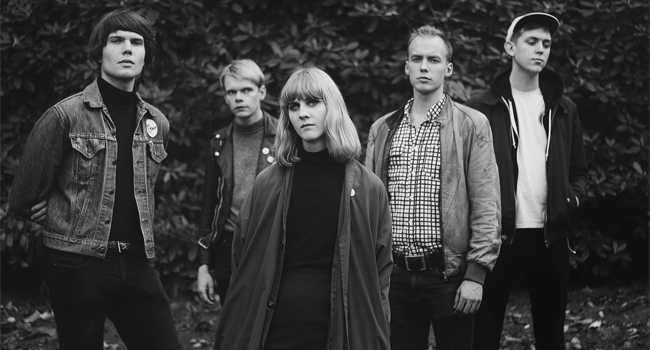In a snug carriage house tucked somewhere off Cortland Ave. in Chicago, three of the seven-odd members of The Right Now are getting into the funk. Spinning on the turntable is their newest LP, fresh off the mixing board, the product of a dusty summer week in Los Angeles laying down tape with Orgone mastermind Sergio Rios. There’s a few glasses of two-buck-chuck going round, though the cheese is not nearly as tongue-in-cheek, an artisan spread that saxaphonist Jonathon Edward’s dad scoured Michigan for, along with some bread and salami (for the purposes of the article it should be noted that Edwards sports a killer handlebar stache—perhaps best described as ‘Snidely Whiplash.’)
The band, which took its title from the Reverend Al Green tune of the same name, represents a proud host of musical styles. Edwards is formally trained in Jazz while Guitarist and backup vocalist Chris Corsale plies a background in rock. They all manage to meet somewhere in the middle and the band, especially singer Stefanie Berecz, take cues from the new guys just as they do the classics. “There’s not any one vision or drive,” Edwards says. Unlike James Brown commanding his contigent with an iron fist, The Right Now take a stab at the impossible—a total democracy.
How does a soul band coalesce—short of auditions or a horn section spontaneously materializing? Almost by accident. “I think we were a bunch of misfits,” Edwards says of the time he and future members started haunting The Winds (now Longman and Eagle) a local dive with grease-stained walls, regular townies and a superb jukebox. Bonding over tastes that ranged from Nina Simone to Justin Timberlake, the core of the band began to play together in a fashion that can only be described as serendipitous, when they recognized Stefanie Berecz’s silky wail, “She sounds like Aretha Franklin—we should do Aretha Franklin!” they began to play The Winds as a cover act—doing the songs they loved on a stage that was not really a stage at all. At the time the band was by Edwards account, “turning a lot more into a retro outfit,” but the era was short-lived. Brendon O’Connell, the band’s keyboardist brought a few originals to rehearsal and little by little, a band was born from an imitation. They began playing three hour shows around town, up to six nights a week.
The timing was perfect. 2008 was a year riding on the coat tails of iconic UK soul releases from Amy Winehouse and Joss Stone. Stateside, Sharon Jones had released her critically lauded album 100 Days, 100 Nights and Raphael Saadiq had The Way I See It, not to mention the lingering aftertaste of St. Elsewhere and a new Gnarls Barkley album slated for release. The airwaves were fertile for a takeover. The Right Now went on the road with their filthily funky sound—though as one can imagine, feeding seven mouths in the twilight zone of indie touring can be difficult. The band adapted a “modern sort-of hunting and gathering” finding complimentary buffets and buying day-old bread at Jimmy John’s. Though they found love on the road for their infectious sounds they were met with the characteristic obscurity of newcomers.
It wasn’t long before they were opening for bigger acts: George Clinton, Bela Fleck and Otis Clay, who hailed Berecz “Tough as nails.”
Flip through their YouTube and you’ll find the band in matching mandarin shirts and ties filling the airwaves at KDHX St. Louis, marching second-line down 6th street in Austin for SXSW and rip-roaring through “You Will Know,” at Summerfest in Milwaukee. The band isn’t ashamed of its own stomping ground, citing Earth, Wind & Fire, Curtis Mayfield and Etta James as a tradition “not locked down by a label,” one that’s informed their sound without precluding it. Though the city has been the crossroads of American music styles ‘Chicago’ to the band simply means, “Well presented pop music with a fuckload of soul in it.”
In person, singer Stefanie Berecz is calm and pensive. By accounts of her bandmates, she is constantly at work absorbing what’s around her—a turn of phrase, a melody or how something’s done—a knack that has rewarded her with an inimitably soulful voice and powerful stage presence. Co-writing with O’Connell, she draws lyrical inspiration from experience, “Every lame guy I’ve ever dated” but also from deep-seated compassion. Stefanie is both a mother—discovering she was pregnant on the band’s first tour—and a nurse, oftentimes writing on the hour break she gets from long hospital shifts. It’s a process she refers to as “getting into character” and crucial to understanding the staying power and theatrical presence of legends. Anyone in the band would love to be a full-time souler, but for now it’s just that—a character precluded by reality. One cut from the record, “I Could Kiss You, I Could Cry” was inspired by Page 8 of the Redeye, the section Berecz “can’t stand to read,” which has been dedicated to listing the victims of Chicago homicides in 2012, a list larger than its been in years. “Being a mother it came from a real place, it was something I could relate to,” she says and knowing her rare empathy, she means it.
Don’t call Soul a comeback, “People want to pretend it happened at one time but it’s continuous,” Corsale says.
Though its fanbase has shifted, the product marketed differently, he’s not wrong. Despite the tendency of critics and artists to pronounce a genre ‘dead’—soul has survived on the airwaves in some form or another for at least sixty years. The Right Now, rather than fight a mainstream association, prefers the label “pop soul,” which may sound like an oxymoron but functions as a mission statement; bringing soul to the people. Look no further than acts like Adele, Duffy or even Cee-Lo Green to know that classically aligned soul can make a huge impact, even in these days of attention-deficit tastes.
The pop aspect stems not from a desire for popularity but for well-crafted ideas, the majestic songmanship of Curtis Mayfield versus the primal one-chord grooving of James Brown. How do they feel about sharing stages next to 808s and delay pedals? Edwards cites a recent study that found the human brain responds differently, with more stimulation, to hearing an instrument played live. How do these electrical impulses make you feel? Catch The Right Now and find out. Their latest, Gets Over You (most likely a reference to Al Green’s Gets Next to You), combines liquid grooves with doleful moods, the pain of suffering through a bad relationship with the sweet catharsis of moving on. Here is a rare talent, a band that appreciates the trouble of doing soul straight-faced, not as a bell-jar in a museum nor as a campy parody of itself—it’s always, even in the hard times, with a smile.



